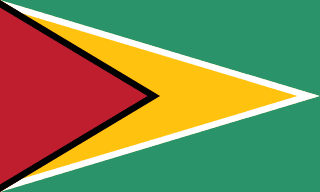Guyana - Government

Based on the etymolgy of Guyana, it was the name is derived from Guiana, the original name for the region that included British Guiana, Dutch Guiana, and French Guiana; the name Guiana may be derived from a local term meaning "Land of Water" (referring to the area's multitude of rivers and streams). The Government system in this country is the parliamentary republic type and the different Administrative divisions includes: 10 regions; Barima-Waini, Cuyuni-Mazaruni, Demerara-Mahaica, East Berbice-Corentyne, Essequibo Islands-West Demerara, Mahaica-Berbice, Pomeroon-Supenaam, Potaro-Siparuni, Upper Demerara-Berbice, Upper Takutu-Upper Essequibo
National symbols
Canje pheasant (hoatzin), jaguar, Victoria Regia water lily.
The flag
The National flag of Guyana has .
Info
The National Anthem
| Title | |
|---|---|
| Lyric/music |
Info
More about the government of Guyana
| Date of Independence | 26 May 1966 (from the UK) |
|---|---|
| National holiday | Republic Day, 23 February (1970) |
| Legal system | common law system, based on the English model, with some Roman-Dutch civil law influence |
| International law organization participation | has not submitted an ICJ jurisdiction declaration; accepts ICCt jurisdiction |
| Constitution | |
| History | Several previous; latest promulgated 6 October 1980 |
| Amendment process | Proposed by the National Assembly; passage of amendments affecting constitutional articles, such as national sovereignty, government structure and powers, and constitutional amendment procedures, requires approval by the Assembly membership, approval in a referendum, and assent of the president; other amendments only require Assembly approval |
| Citizenship | |
| Citizenship by birth | yes |
| Citizenship by descent only | yes |
| Dual citizenship recognized | no |
| Residency requirement for naturalization | na |
| Executive Branch | |
| Chief of state | President Mohammed Irfaan ALI (since 2 August 2020) |
| Head of government | President Mohammed Irfaan ALI (since 2 August 2020) |
| Cabinet | Cabinet of Ministers appointed by the president, responsible to the National Assembly |
| Election/appointment process | the predesignated candidate of the winning party in the last National Assembly election becomes president for a 5-year term (no term limits); prime minister appointed by the president |
| Most recent election date | 1 September 2025 |
| Election results | 2025: Mohammed Irfaan ALI (PPP/C) reelected president by the majority party in the National Assembly 2020: Mohammed Irfaan ALI (PPP/C) designated president by the majority party in the National Assembly 2015: David GRANGER (APNU-AFC) designated president by the majority party in the National Assembly |
| Expected date of next election | August 2030 |
| Legislative branch | |
| Legislature name | Parliament of the Co-operative Republic of Guyana |
| Legislative structure | Unicameral |
| Chamber name | National Assembly |
| Number of seats | 72 (all directly elected) |
| Electoral system | Proportional representation |
| Scope of elections | Full renewal |
| Term in office | 5 years |
| Most recent election date | 9/1/2025 |
| Parties elected and seats per party | People's Progressive Party/Civic (PPP/C) (36); We Invest in Nationhood (W.I.N.) (16); A Partnership for National Unity (APNU) (12); Other (1) |
| Percentage of women in chamber | 36.1% |
| Expected date of next election | August 2030 |
| Judicial branch | |
| Highest court(s) | Supreme Court of Judicature (consists of the Court of Appeal with a chief justice and 3 justices, and the High Court with a chief justice and 10 justices organized into 3- or 5-judge panels); Caribbean Court of Justice is the final court of appeal in civil and criminal cases |
| Judge selection and term of office | Court of Appeal and High Court chief justices appointed by the president; other judges of both courts appointed by the Judicial Service Commission, a body appointed by the president; judges appointed for life with retirement at age 65 |
| Subordinate courts | Land Court; magistrates' courts |
| Diplomatic representation in the US | |
| Chief of mission | Ambassador Samuel Archibald HINDS (since 7 July 2021) |
| Chancery | 2490 Tracy Place NW, Washington, DC 20008 |
| Telephone | [1] (202) 265-6900 |
| FAX | [1] (202) 232-1297 |
| Email address and website | [email protected] http://www.guyanaembassydc.org/ |
| Consulate(s) general | New York |
| Diplomatic representation from the US | |
| Chief of mission | Ambassador Nicole THERIOT (since 14 October 2023) |
| Embassy | 100 Young and Duke Streets, Kingston, Georgetown |
| Mailing address | 3170 Georgetown Place, Washington DC 20521-3170 |
| Telephone | [592] 225-4900 through 4909 |
| FAX | [592] 225-8497 |
| Email address and website | [email protected] https://gy.usembassy.gov/ |
Key Political parties and their leaders in Guyana
Info
International organization participation
All Important Facts about Guyana
Want to know more about Guyana? Check all different factbooks for Guyana below.









